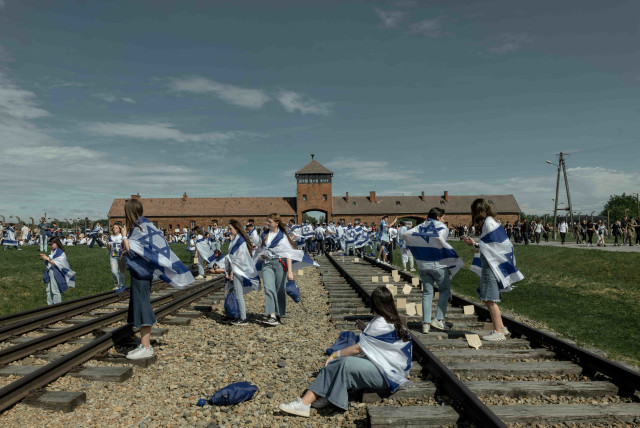On a mission to Auschwitz, I found hope amid the ashes - opinion

I visited Krakow again to work on Jewish-Polish reconciliation and yet again in 2022, in the early days of Russia’s invasion of Ukraine, when the shadow of war once again loomed over Europe.
(JTA) — Last month, I returned to Poland for my fifth visit, this time as part of the European Jewish Association’s annual mission to Auschwitz. The gathering brought together Jewish and non-Jewish leaders from across Europe and beyond, united by the urgency to confront rising antisemitism and the shared challenges of our time.
I laid a wreath at Birkenau — a somber reminder of the atrocities our people endured and a call to action against the resurgence of hatred today — and I was honored to give the keynote address.
Krakow has always been a city of profound historical and personal significance to me. Nearly 30 summers ago, between my undergraduate and graduate studies in the US, I first walked its streets as a student at Jagiellonian University, delving into the history of Eastern European Jewry and the Holocaust. Living just down the hall from me in the dormitory was Heidi, a graduate student at NYU I did not yet know but who would soon become my wife. Our shared experiences in Krakow formed the foundation of our life together. Returning to this city now, decades later — having raised two daughters who for me symbolize Jewish resilience and continuity — reminds me of the miracle of our survival.
I visited Krakow again to work on Jewish-Polish reconciliation and yet again in 2022, in the early days of Russia’s invasion of Ukraine, when the shadow of war once again loomed over Europe. But this time, my return was marked by a different crisis: the resurgence of antisemitism, fueled by the October 7, 2023, massacre in Israel and violent acts like the recent attacks on Jews in Amsterdam after a soccer match.
Parallels between past and present
The parallels between the past and present are stark and chilling. Standing in Krakow, just weeks after Jews were hunted in the streets of Amsterdam, I could not help but reflect on the 86th anniversary of Kristallnacht. Then, as now, hatred unchecked has spiraled into violence. That history has left us with scars, but also with lessons to be learned — first and foremost that we cannot remain passive in the face of such threats. There are other lessons as well:
From mourning to mobilization: October 7 marked the deadliest day for the Jewish people since the Holocaust. The slaughter of 1,200 Israelis — most of them civilians engaged in mundane, life-affirming acts — was a shattering moment for our community. Yet the horror did not end there. The massacre was celebrated in Western capitals, with protests erupting in support of Hamas’s barbarity. Social media amplified the vitriol, emboldening antisemites to bring their hatred into the public square.
Amidst this darkness, however, we have witnessed extraordinary resilience. Across the Diaspora, Jewish communities are rising to meet this moment. In the United States, synagogues are fuller, Jewish symbols are more visible, and advocacy has reached unprecedented levels. These are not mere reactions to trauma but acts of defiance and pride.
I’ve seen this firsthand in the mobilization of Jewish advocacy groups at school boards, city councils, and Congress. This grassroots activism is making a tangible difference, from securing protections for Jewish students on campuses to advancing the adoption of the International Holocaust Remembrance Alliance definition of antisemitism in state legislatures. These efforts demonstrate that enduring is not a passive act — it is a proactive, determined stance against those who seek to harm us.
Unity and self-defense: The Holocaust and October 7 remind us of the perils of statelessness and the necessity of a strong, secure Israel. The State of Israel is an indispensable guarantor of Jewish safety. Its ability to defend itself and to serve as a refuge for Jews worldwide is central to our collective strength.
But this moment also demands unity. The divisions that occasionally splinter Jewish communities must be set aside in the face of existential threats. From the exiles of antiquity to the pogroms of the shtetl, from the Holocaust to the atrocities of October 7, history has shown that Jewish survival depends on our ability to stand together.
Hope amid the ashes: To return to Krakow, a place steeped in Jewish history and scarred by unspeakable horrors, is to confront both the depths of our suffering and the heights of our resilience. As I stood at Birkenau, I was reminded of the enduring spirit of our people. We are here. We endure. And we will not be cowed.
But hope alone is not enough. It must be paired with action — political advocacy, education and the relentless pursuit of justice. Our history is one of perseverance and progress. We have faced darker days and emerged stronger. As I reflect on the mission to Krakow and the work that still lies ahead, I am inspired by the unity and determination of our community. Let us ensure that this moment of reckoning becomes a turning point for global Jewry — a moment when we not only endured but rose to build a stronger, safer future.
Jerusalem Post Store
`; document.getElementById("linkPremium").innerHTML = cont; var divWithLink = document.getElementById("premium-link"); if (divWithLink !== null && divWithLink !== 'undefined') { divWithLink.style.border = "solid 1px #cb0f3e"; divWithLink.style.textAlign = "center"; divWithLink.style.marginBottom = "15px"; divWithLink.style.marginTop = "15px"; divWithLink.style.width = "100%"; divWithLink.style.backgroundColor = "#122952"; divWithLink.style.color = "#ffffff"; divWithLink.style.lineHeight = "1.5"; } } (function (v, i) { });

